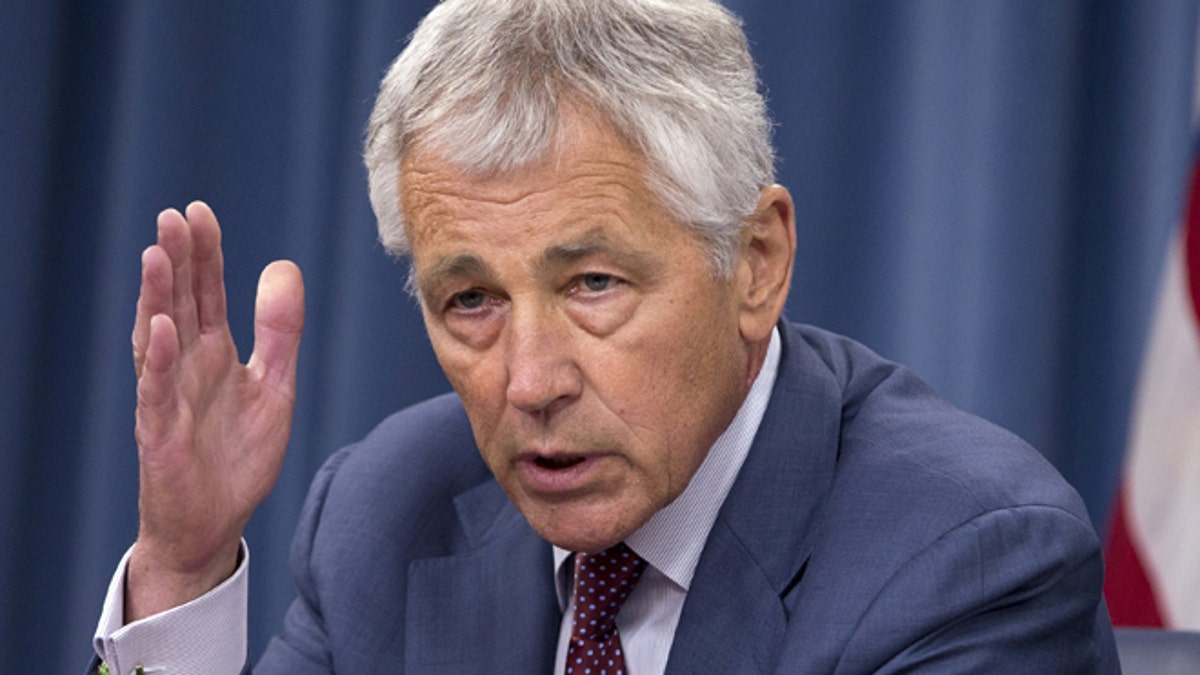
July 31, 2013: In this file photo, Defense Secretary Chuck Hagel speaks during a news conference at the Pentagon. (AP)
WASHINGTON – The Pentagon is poised to extend health care, housing and other benefits to the same-sex spouses of military members by the end of August, but may reverse earlier plans to provide benefits to gay partners who are not married.
According to a draft Defense Department memo obtained Wednesday by The Associated Press, the department instead may provide up to 10 days of leave to military personnel in same-sex relationships so they can travel to states where they can marry legally.
While no final decisions have been made, the memo from Defense Secretary Chuck Hagel to top defense leaders would reverse an earlier plan that would allow the same-sex partners of military members to sign a declaration form in order to receive limited benefits, such as access to military stores and some health and welfare programs.
The recent Supreme Court decision extending federal benefits to legally married same-sex couples eliminates the need for such a plan, Hagel said in the draft.
"As the Supreme Court's ruling has made it possible for same-sex couples to marry and be afforded all benefits available to any military spouse and family, I have determined, consistent with the unanimous advice of the members of the Joint Chiefs of Staff, that the spousal and family benefits far outweigh the benefits that could be extended under a declaration system," Hagel wrote.
According to a U.S. official, the memo is under legal review by the Justice Department, and the Pentagon will not be able to take any action until that review is finished.
"Although we have bases and installations in all 50 states, not all state laws are equal when it comes to same sex marriage," a defense official said. "That is why we are looking at providing extra leave for same sex couples who want to get married to travel to a state where same sex marriages are legal." The officials were not authorized to discuss the memo publicly, so spoke on condition of anonymity.
Pentagon officials would not comment on the specifics of the memo. A Defense Department spokesman, Lt. Cmdr. Nate Christensen, said only that the Pentagon "is working alongside the Department of Justice to implement the court's decision as quickly as possible."
In February, then-Defense Secretary Leon Panetta announced that by no later than Oct. 1 the Pentagon would extend some limited benefits to same-sex partners of service members. Housing benefits were not included, but the plans called for same-sex partners to get special identification cards granting them access to commissaries and other services.
The benefits would be contingent on the service member and their same-sex partner signing a declaration that they were in a committed relationship.
At the time, officials said that if the Supreme Court ruled on the federal Defense of Marriage Act the issue would be revisited. The act prohibited the federal government from recognizing any marriage other than that between a man and a woman.
In late June, the court cleared the way for legally married gay couples to be recognized under federal law, and also allowed same-sex marriages in California to resume. It did not issue any sweeping declarations that would allow same-sex couples to marry anywhere in the country.
When the ruling was announced, Hagel said the Pentagon would reassess the department's decisions on benefits for same-sex couples, and also begin the process of extending benefits to same-sex spouses of military members.
In the new draft memo, Hagel says the department intends to treat all married military personnel the same and "make the same benefits available to all military spouses, regardless of sexual orientation."
But, recognizing that same-sex couples are only allowed to marry in a limited number of states, Hagel said the provision allowing service members to travel to states where the unions are legal is a way to help overcome those challenges.
Defense officials estimate there are 18,000 same-sex couples in the active-duty military, National Guard and Reserves. It's unclear how many of those are married.
The repeal of the ban on openly gay military service took effect in September 2011.




